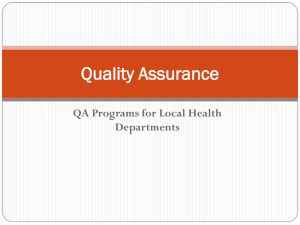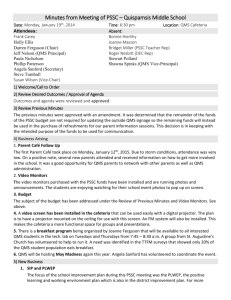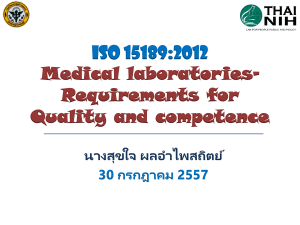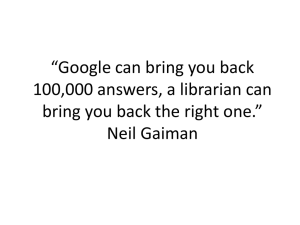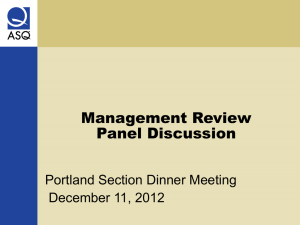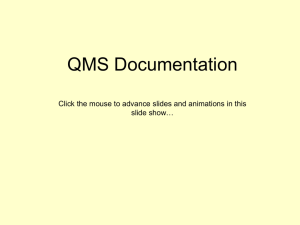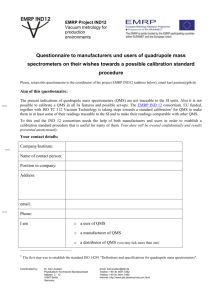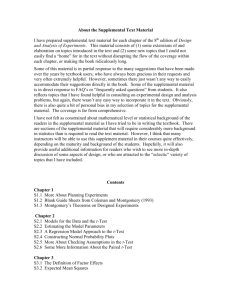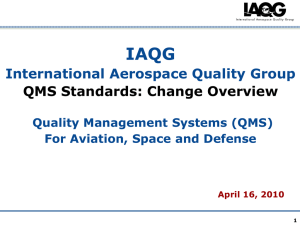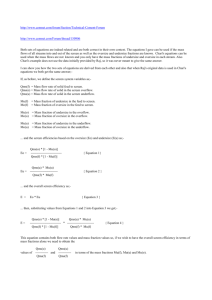Quality management system II ()
advertisement
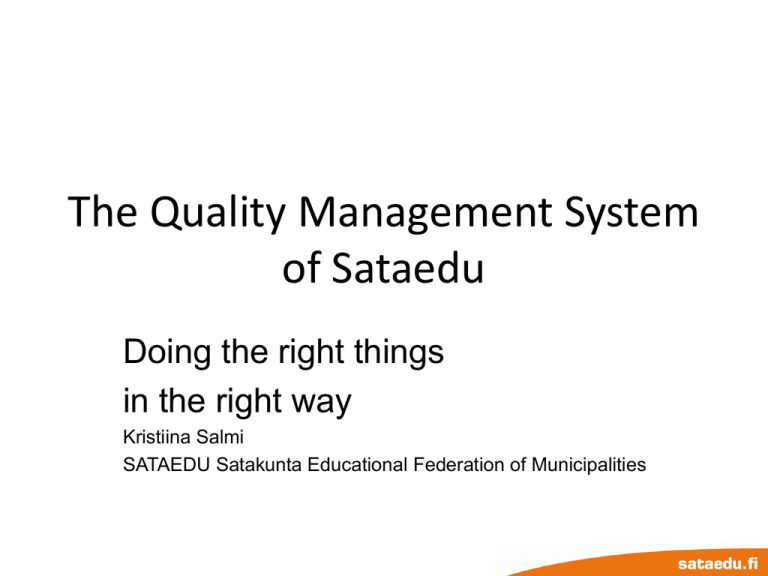
The Quality Management System of Sataedu Doing the right things in the right way Kristiina Salmi SATAEDU Satakunta Educational Federation of Municipalities Sataedu is a new organisation • Our goal is to have one united Sataedu • With the help of Quality Management System unity will be achieved –A management tool in our changing process –All the work done in Sataedu is in scope of this quality system –Whole personnel is committed to and responsible for the quality system –It helps to understand our: • Objectives , goals • Results • Development targets In other words it defines the course of our organisation Quality system is based on - Quality management system ISO 9001 - Environmental management system ISO 14001 Sertified in April 2010 - Occupational health and safety management system OHSAS 18001 Intend to sertify in January 2012 Process approach in Sataedu JOHTAMINEN JA KEHITTÄMINEN A S I A K A S TALOUSHALLINTO HENKILÖSTÖHALLINTO TIETOHALLINTO MARKKINOINTI JA VIESTINTÄ OPETUS JA OHJAUS ALUEKEHITTÄMINEN OPISKELIJAPALVELUT RAVITSEMISPALVELUT PUHDISTUSPALVELUT TEKNISET PALVELUT A S I A K A S T Y Y T Y V Ä I S Y Y S Process approach in Sataedu Core processes: – Teaching and supervising – Regional impact Supporting processes: – Management and development – Financial management – Personnel management – Information management – Communication and marketing – Services for students – Food services – Cleaning services – Technical services, property maintenance Objectives for operation in Sataedu are defined in QS - SATAEDU mission, vision and values - SATAEDU quality policy, environmental policy and occupational health and safety policy = Sataedu operating policy - SATAEDU strategy and programmes: pedagogical, adult education, personnel and enviromental programme => quality and enviromental objectives of Sataedu Well-being programme in 2012 => occupational health and safety objectives - - Objectives and plans of processes All work and operation in Sataedu is guided with QMS - Work during processes is guided on two levels - procedures - Macro level – on federation of municipalities - director - Micro level – on unit level - principal - Procedures determine: who, where, when and what – but not how - We trust on knowledge and skills of personnel: education and experiences - QMS describes responsibilities and authorities of personnel - Organisation chart and matrix of authorities We are evaluating our operation with QMS - Evaluating shall demonstrate the ability of processes to achieve planned results - Measurement of customer satisfaction: students, personnel, customers, interested parties - Satisfaction of students and personnel are measured two times in a year - Image research - Measurements of process performances: graduates, becoming employed, financial statements,amount of waste … .. evaluating - Internal audits - our operations conforms the planned arrangements - Strengths, developing tasks and developing suggestions, nonconformities - Principals in internal audits are confidientiality and independence - 40 educated auditors - About 30 internal audits in a year … evaluating - Preventive and corrective actions - - Management review - - The team, who carries the responsibility, takes corrective actions These actions are documented to the memo of the team Sataedu management group reviews QMS to ensure its continuing sustainability, adequancy and effectiveness MG evaluates the objectives and results of the organisation MG uses the data provided by QS, for example: - Feedback of different processes - Previous corrective actions - Satisfaction surveys External audit - Once in a year by Det Norske Veritas April 2010, January 2011, January 2012 Ruori (rudder, steering wheel) Ruori is Sataedu´s Intranet It´s built on processes of QMS There are all prosedures, documents, memos, results .. Quality group Quality manager on the makro level - Ensuring that processes needed the QMS are established and maintained Is reporting to management group on the performance of the QMS and any need for improvement Quality supervisor on the mikro level within the units Environment supervisors Safety supervisors Quality is - Achieving common goals Giving feedback Evaluation and development Acting according to common values Participating in quality work Environmental management system Plan – Do – Check – Act (PDCA) = Continual improvement Plan: Establish the objectives and processes necessary to deliver results in accordance with the organization´s environmental policy Do: Implement processes Check: monitor and measure processes against environmetal policy, objectives and targets Act: take actions to continually improve performance of the environmental management system 15 Environmental policy Satakunta Educational Federation of Municipalities is committed to considering the environmental effects of all its activities and to minimizing their negative effects to the environment. We continually aim to enhance the level of our environmental abilities. We guide our students and staff towards healthy and sustainable activities. Based on our vision, mission and basic values Sataedu Environmental programme 2010-2012: Environmental review once in a programme period PDCA Identify the environmental aspects Determine the aspects which have significant impacts on the environment Legal requirements and other requirements to environmental aspects Enviromental Law Registry Plan Establish environmental objectives and targets Define means, resbonsibilities and time-frame once in an year Implementation Do Measurement, evaluating Check Improvement actions Act Environmental review in every unit in 2009: • • • • • • • • • Legal requirements to environmental performance Use of natural resources, water, energy Use of raw materials Waste treatment and sorting Hazardous and toxic waste Emissioins to air and water Soil and groundwater contamination Noise and dust Occupational health and safety systems Identify the environmental aspects • • • • • • • • The amount of waste, sorting and recycling Occupational safety Smoking Consumptions of paper products Electrical and thermal energy use Water use Eco-friendliness of procurement Use of web conferencing platform Determine the aspects which have significant impacts on the environment Criterion Rating scale 0 1 2 3 a) Legal requirements No requirements Some of req.. Normed Subject of license b) Impact on environment No impact Some impact Clear impact Significant impact c) Amount of waste Little Some Much Very much d) Requirements of stakeholders No mention Discussed Hopes Absolut reguirements e) Costs/benefits Very high High Some Little f) Failure probability Very improbable Improbable Probable Very probable g) Capability to inluence Very little Little Good Very good 20 Enviromental aspects Sataedu Environmental aspects Environmental impact (a+2b+c+d+e+f) *g Smoking Health, cleanliness, fire, image 2 3 2 2 1 3 2 32 Occupational safety Accidents 2 3 1 2 2 1 2 28 The amount of waste, sorting and recycling Environmental load 1 2 1 2 1 3 2 24 Use of web conferencing platform Emissions from transport 0 2 1 1 1 1 1 21 Consumptions of paper products Environemtal load 0 1 2 1 2 2 2 18 Eco-friendliness of procurement Environmental load 0 1 1 1 1 2 2 14 Electrical and thermal energy use Environmental load 0 1 1 1 2 2 2 14 Water use Enviromental load 0 1 0 1 2 1 1 6 21 = Establish environmental objectives and targets • • • • Eco-friendly life-cycle management Smoking reduction, stuff and students Reduction in paper consumption Reduction in electrical and thermal energy use Define means, responsibilities and time-frame Target Means Resbonsility Time-frame Eco-friendly life-cycle management 1. Environmental aspect in procurement Talousjohtaja v. 2010 tehty/ei tehty 2. Long life of machines with maintenance Tekniset tiimit v. 2010 - käyttöiän seuranta 3. Recycling of waste, raw material, machines ect Opintoalavastaavat, ympäristövastaavat Ympäristövastaavat v. 2010 - tehty/ei tehty 4. Sorting waste, especially hazardous waste 5. Hazardous chemicals in use and storage Ympäristövastaavat 6. Staff and student orientation and education Ympäristövastaavat. henkilöstö Apulaisrehtorit/ opintoalavastaavat Tietohall.tiimin vetäjä Rehtorit, Savuton Sataedu- työryhmä 7. Sustainable development in curriculums Smoking reduction, stuff and students 8. Use of web conferencing platform 1. Non-smoking units 2. Support to smoking cessation for students and stuff Apulaisrehtorit 3. Control and disciplinary procedures 23 Measurement tehty/ei tehty v. 2010 v. 2010 v. 2010 - tehty/ei tehty v. 2011 - toteutetut perehdytykset tehty/ei tehty v. 2010 1.8.2010 Ao v. 2012 Ak v. 2010 v. 2010 alustan käyttö tehty/ei tehty tupakoitsevien määrä tehty/ei tehty Reduction in paper consumption Reduction in electrical and thermal energy use 1. Mitataan paperinkulutus kaikissa yksiköissä ja näiden tietojen pohjalta asetetaan tavoiteaikataulu paperinkulutuksen vähentämiselle. 2. Paperinkulutuksen vähentämiseksi siirretään opetusta ja muuta työtä sähköiseen muotoon, kehitetään sähköistä asiakirjahallintaa, minimoidaan tulostusmääriä ja toteutetaan tulostus oletuksena kaksipuoleisesti. 3. Opastetaan henkilökuntaa ja opiskelijoita paperinkulutuksen pienentämiseen. Talousjohtaja v. 2010 tehty/ei tehty Tietohallintotiimi v. 2011 paperinkulutus Tietohallintotiimi, v. 2010 - paperinkulutus v. 2010 tehty/ei tehty v. 2011 sähkönkulutus v. 2011 lämmityskustannuk set 1. Toteutetaan sähkön- ja lämmönkulutuksen mittaaminen Tekniset tiimit kaikissa yksiköissä ja sen jälkeen asetetaan tavoitteet niiden vähentämiseksi. 2. Kehitetään sähkönkulutuksen automaattista valvontaa ja Rehtorit, tekniset tiimit ohjausta. 3. Pienennetään lämmönkulutusta rakennuksittain varmistamalla Rehtorit, tekniset tiimit rakenteiden, ikkunoiden ja ovien lämmöneristys ja tiiviys. Sataedu´s environmental programme - Ready in July 2010 - First check in July 2011 - ISO 14001 sertified in April 2010 Measurement and evaluating - Amount of waste Amount of smoking stuff and Paper consumption Water consumption Use of web conferencing platform Electrical and thermal energy use Accidents at work Improvement actions - By tools of quality system: - Internal audits - Preventive and corrective actions - Management review - Much to do: - Awareness - Commitment - Measuring - Competence, training and awareness Documentation and measurement Operational control Emergency preparedness and response Communications - Internal communication - External communication 28

